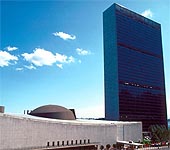 The latest monthly release of civil penalty information by the Office of Foreign Assets Control (“OFAC”) describes a penalty “settlement’ with the United Nations Federal Credit Union, which agreed to pay $500,000 to settle charges that the UNFCU “dealt in property in which Cuba or a Cuban national had an interest’ — as they quaintly say it in OFAC-speak. In ordinary English this means that UNFCU engaged in banking transactions with Cubans, likely with Cuban diplomats to the United Nations.
The latest monthly release of civil penalty information by the Office of Foreign Assets Control (“OFAC”) describes a penalty “settlement’ with the United Nations Federal Credit Union, which agreed to pay $500,000 to settle charges that the UNFCU “dealt in property in which Cuba or a Cuban national had an interest’ — as they quaintly say it in OFAC-speak. In ordinary English this means that UNFCU engaged in banking transactions with Cubans, likely with Cuban diplomats to the United Nations.
Of course, we have to say the transactions were likely with Cuban diplomats because, given OFAC’s longstanding aversion to providing anything but the most minimal details about its penalty settlements, the notice leaves out such crucial details as whether the Cubans involved were diplomats, non-diplomatic Cuban officials, ordinary Cubans, or herds of Cuban cattle. Nor were the types of transactions involved mentioned or their amounts.
In this case, the absence of details makes OFAC look foolish by suggesting the possibility that OFAC is penalizing the UNFCU for providing banking services to Cuban diplomats posted to the U.N. Apparently, such diplomats need to travel with suitcases of Cuban pesos and pay for their meals in the U.N. cafeteria with their national currency.
If that’s what OFAC is doing, it would be in direct contravention of the U.N. Headquarters Agreement, particularly given that the UNFCU is located in the U.N. Headquarters area. Article V, Section 15(4) of that agreement provides that even with respect to diplomats from countries not recognized by the United States, such as Cuba, the U.S. must accord them the same privileges and immunities as other diplomats while within the headquarters district. If a diplomat from France can bank at the UNFCU located in the U.N. Headquarters district, so can Cuban diplomats, no matter how much OFAC hates Castro and his diplomatic lackeys.
The UNFCU website has this statement (click on “Account Restrictions”) about its ability to deal with Cuban diplomats:
Please be aware that UNFCU, under authorization from the US Treasury Department, is only permitted to operate accounts for actively employed UN staff stationed in Cuba, Iran, Burma, and for Cuban citizens who are stationed in the United States.
Based on this, perhaps what was going on — and again OFAC forces us to speculate — was that the UNFCU was providing banking services to Cubans at U.N. locations outside the United States. The UNFCU website’s branch listing shows that the UNFCU has branches in Geneva, Vienna, Rome and Nairobi. Of course, the UNFCU’s extra-territorial application of U.S. sanctions could create a new problem for itself because these sanctions could well violate local laws that prohibit discrimination based on national origin.
Additionally, and more significantly, the UN could always solve the problem by only providing office space to financial institutions that do not, like UNFCU, discriminate against UN members based on national origin.
 Permalink
Permalink
Copyright © 2010 Clif Burns. All Rights Reserved.
(No republication, syndication or use permitted without my consent.)

 Posted by
Posted by  Category:
Category: 

